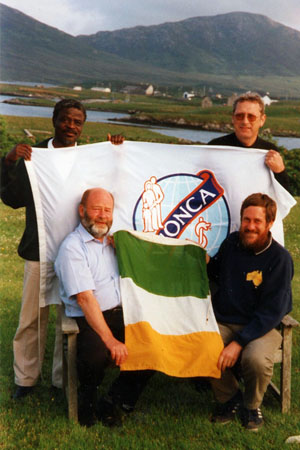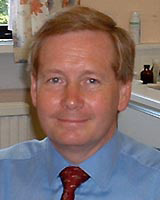Dr John A J Macleod
MBE DL, MBCHB, DCH, DCROG, FRCP(Glas), FRCGP, FFCS
1935-2009

John McLeod (bottom left) at a meeting of the Wonca Rural Group in Lochmaddy, North Uist, Scotland in 1998.
Dr John MacLeod died following heart surgery in September 2009 at the age of 74, 2 months after giving the keynote address on Island Health to the Wonca 2009 Rural Conference in Crete. John was an iconic rural doctor who made a significant contribution to international rural health throughout his career.
John was family doctor to the island of North Uist, Outer Hebrides, Scotland until his retirement after 27 years in practice. His family's service to the local community totalled 77 years with John following his parents into the family general practice. His parents had helped establish an air ambulance service to the island and were part of the first generation of UK GPs who established the UK National Health Service after the World War II.
John was very proud of his island and family heritage, and contributed in many ways throughout his lifetime to his local community, beyond providing a medical service. He was a passionate advocate for the health of island people but was also passionate about the sea, fishing, marine biology and the Gaelic traditions of his heritage. He represented the Queen on the island but had a common touch with the local crofters (farmers).
John was a founding member of the Wonca Rural Group in 1993 and a familiar figure in his Scottish kilt at international meetings. His work on the Wonca Rural Committee was to encourage and support others and bring the pragmatic realism of a country doctor to conference programs and events.
John was born on North Uist and went to Medical School in Glasgow. He worked in London in hospital jobs before returning to take over the family practice in 1973. The doctors' 'wee boy' returned to the Island as 'Dr John'. He came with Lorna his new wife and a wealth of medical experience to set him up in family practice. Lorna was very much part of the medical team and coped with the change in lifestyle from London to a remote island with wonderful skill and understanding in support of John. Their three children are now successful adults and Lorna has remained an important part of island community life.
John's Royal Navy service after university informed his leadership style of 'leading from the front'. He set high personal and professional standards for himself and others. He was a great networker and mentor to many colleagues in primary care. He was an early member of the Royal College of General Practitioners, like his father, and mapped the early UK pathways for vocational training in General Practice in island communities. Many school students, undergraduates and GP registrars were mentored and inspired by John's approach to clinical practice.
John's was the traditional style of a country GP. He enjoyed home visits and the deep bond of respect with his patients which had been built up over generations. His island practice was pursued with academic rigor and he collaborated in research on blood pressure and radioactive waste from the sea. He conducted many public health campaigns in his local community including one to encourage local fishermen to wear personal floatation devices and avoid the drowning tragedies which had become common place in the islands. He continued this campaign doggedly over 26 years, writing to newspapers and authorities despite opposition. He was eventually recognised with a safety award from the fishing industry newspaper which meant a great deal to him.
John was given the civil MBE medal and Royal College Fellowships in the UK but he valued most his honorary life membership of Wonca. He contributed in many ways to the success of the Wonca rural conferences and working party documents. He always came with a poster or presentation and chaired sessions with great skill. He manned the rural group information booths at conferences and, most importantly, made a great personal effort with people, engaging them in conversation throughout the activities of the conference. He made people feel valued and welcome. John was a generous and thoughtful man with one of his lasting legacies to Rural Wonca being the Scottish theme music commissioned on his own initiative as gift to future conferences.
John's cultural exchange included taking his island to the world but also inviting the world to his island! Everyone he met at conferences was invited to make the journey to Lochmaddy, North Uist, and he delighted in providing Scottish hospitality to his international visitors. This started with the flagpole in his garden from which flew the visitor's national flag in welcome as the ferry entered the bay below his house.
John had a full professional and personal life which was well lived and celebrated by the Lochmaddy community at his funeral service. There were kilts, pipers and drams ('wee whiskies') as he was buried on the island Machair (beach meadow).This was followed by a memorial service in the Chapel, University of Glasgow, for friends and colleagues in the Scottish medical community. The University of Glasgow is 550 years old and the chapel had many family connections for John. The traditional service was mixed with anecdotes about John, which he would have appreciated and enjoyed. Adding a modern twist to tradition, the University chapel's webcam enabled broadcast of the formal proceedings over the internet, allowing the Wonca Rural Group in particular to celebrate John's life and contribution to the success of the world rural health movement. This was another first for John who always adopted new technology with enthusiasm as a method of extending international collaboration. He would have chuckled deeply about the contrast of 550 years of university tradition and the worldwide web network in 2010.
As an international rural medical community we have lost the man - but his traditions, values and music will live on through future rural conferences.
